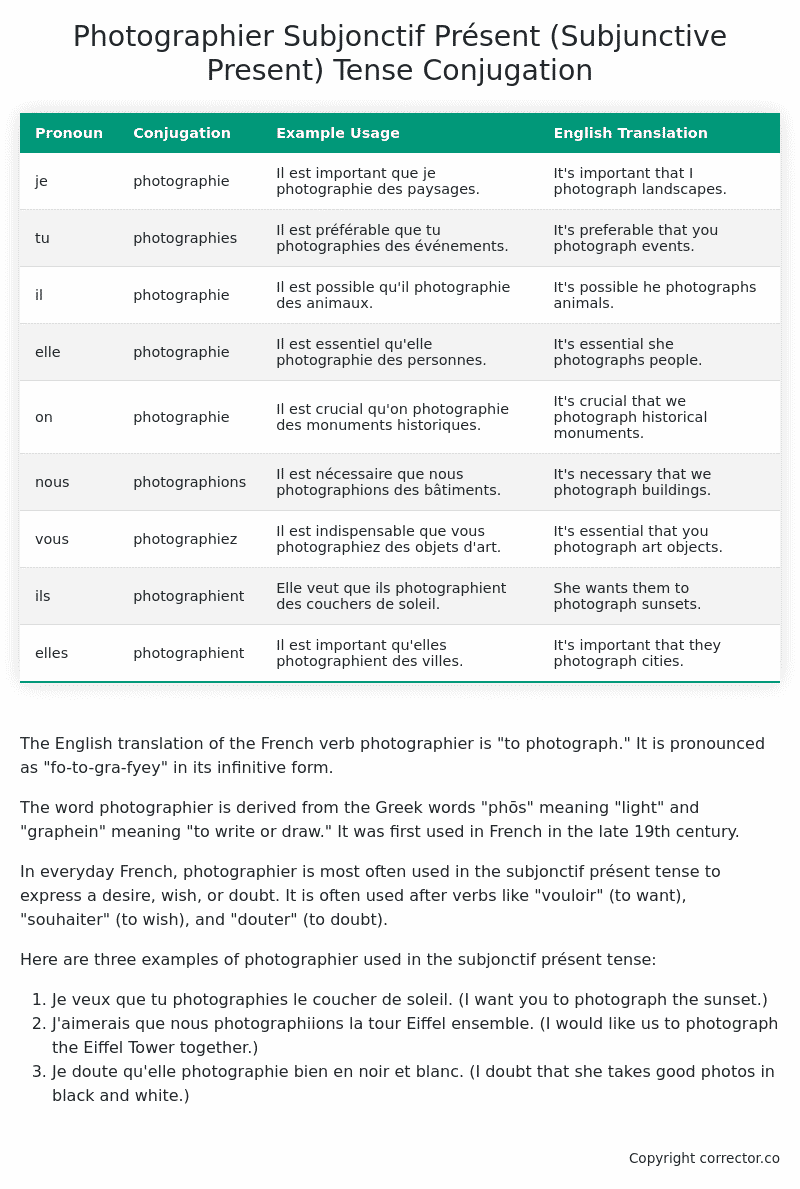Subjonctif Présent (Subjunctive Present) Tense Conjugation of the French Verb photographier
Introduction to the verb photographier
The English translation of the French verb photographier is “to photograph.” It is pronounced as “fo-to-gra-fyey” in its infinitive form.
The word photographier is derived from the Greek words “phōs” meaning “light” and “graphein” meaning “to write or draw.” It was first used in French in the late 19th century.
In everyday French, photographier is most often used in the subjonctif présent tense to express a desire, wish, or doubt. It is often used after verbs like “vouloir” (to want), “souhaiter” (to wish), and “douter” (to doubt).
Here are three examples of photographier used in the subjonctif présent tense:
- Je veux que tu photographies le coucher de soleil. (I want you to photograph the sunset.)
- J’aimerais que nous photographiions la tour Eiffel ensemble. (I would like us to photograph the Eiffel Tower together.)
- Je doute qu’elle photographie bien en noir et blanc. (I doubt that she takes good photos in black and white.)
Table of the Subjonctif Présent (Subjunctive Present) Tense Conjugation of photographier
| Pronoun | Conjugation | Example Usage | English Translation |
|---|---|---|---|
| je | photographie | Il est important que je photographie des paysages. | It’s important that I photograph landscapes. |
| tu | photographies | Il est préférable que tu photographies des événements. | It’s preferable that you photograph events. |
| il | photographie | Il est possible qu’il photographie des animaux. | It’s possible he photographs animals. |
| elle | photographie | Il est essentiel qu’elle photographie des personnes. | It’s essential she photographs people. |
| on | photographie | Il est crucial qu’on photographie des monuments historiques. | It’s crucial that we photograph historical monuments. |
| nous | photographions | Il est nécessaire que nous photographions des bâtiments. | It’s necessary that we photograph buildings. |
| vous | photographiez | Il est indispensable que vous photographiez des objets d’art. | It’s essential that you photograph art objects. |
| ils | photographient | Elle veut que ils photographient des couchers de soleil. | She wants them to photograph sunsets. |
| elles | photographient | Il est important qu’elles photographient des villes. | It’s important that they photograph cities. |
Other Conjugations for Photographier.
Le Present (Present Tense) Conjugation of the French Verb photographier
Imparfait (Imperfect) Tense Conjugation of the French Verb photographier
Passé Simple (Simple Past) Tense Conjugation of the French Verb photographier
Passé Composé (Present Perfect) Tense Conjugation of the French Verb photographier
Futur Simple (Simple Future) Tense Conjugation of the French Verb photographier
Futur Proche (Near Future) Tense Conjugation of the French Verb photographier
Plus-que-parfait (Pluperfect) Tense Conjugation of the French Verb photographier
Passé Antérieur (Past Anterior) Tense Conjugation of the French Verb photographier
Futur Antérieur (Future Anterior) Tense Conjugation of the French Verb photographier
Subjonctif Présent (Subjunctive Present) Tense Conjugation of the French Verb photographier (this article)
Subjonctif Passé (Subjunctive Past) Tense Conjugation of the French Verb photographier
Subjonctif Imparfait (Subjunctive Imperfect) Tense Conjugation of the French Verb photographier
Conditionnel Présent (Conditional Present) Tense Conjugation of the French Verb photographier
Conditionnel Passé (Conditional Past) Tense Conjugation of the French Verb photographier
L’impératif Présent (Imperative Present) Tense Conjugation of the French Verb photographier
L’infinitif Présent (Infinitive Present) Tense Conjugation of the French Verb photographier
Struggling with French verbs or the language in general? Why not use our free French Grammar Checker – no registration required!
Get a FREE Download Study Sheet of this Conjugation 🔥
Simply right click the image below, click “save image” and get your free reference for the photographier Subjonctif Présent tense conjugation!

Photographier – About the French Subjonctif Présent (Subjunctive Present) Tense
Formation of the Subjonctif Présent
Common Everyday Usage Patterns
Interactions with Other Tenses
Summary
I hope you enjoyed this article on the verb photographier. Still in a learning mood? Check out another TOTALLY random French verb conjugation!


